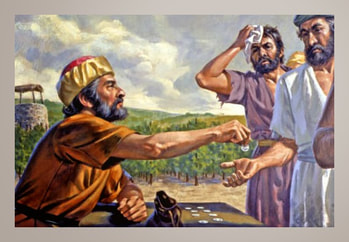 By now, you may have noticed a recurring theme that has been developing as we have been making our way through Matthew’s Gospel: that the Kingdom of God resists all forms of human calculation. Three weeks ago, we heard the well-known paradox from Jesus that “those who want to save their life will lose it, and those who lose their life for my sake will find it.” Here, what normally strikes us as an unremarkable bit of common sense -- self-preservation, that is -- is associated with kind of spiritual death. In the next week’s gospel, the disciples are told that “whatever you bind on earth will be bound in heaven, and whatever you loose on earth will be loosed in heaven.” We learned there that the work of the Church is never merely a matter of human administration; heaven itself is determined somehow by the activity of the Church, binding and loosing. Which in the end means that the Church should go about its business in a radically different way than would otherwise be expected. The knowledge that what is bound and loosed on earth determines what is bound and loosed in heaven itself determines in turn what we bind and loose on earth. And last week, Mother Beth took us through the parable of the slave who, though he was forgiven an unfathomable debt by his master, nevertheless immediately went a demanded a much smaller debt from one of his debtors. As Mother Beth pointed out, the slave couldn’t comprehend that the master’s gesture suspended the whole relationship of debtor-creditor, and that having been liberated from that relationship, he was then expected to take that liberation into his own relationships. What he should have realized was that the grace of God disrupts the categories of deserving and undeserving altogether. This week’s gospel continues this theme with another parable of Jesus, this time about a group of workers in a vineyard. Though I’ll eventually offer a different angle on this parable, the standard interpretation is powerful as well, and warrants a brief discussion. According to the dominant reading of this parable, what we see here is an account of God’s historical plan of salvation that begins with God’s ancient covenant with the Israelites and culminates with the inclusion of the Gentiles into the people of God. The tension between the workers who started their work at the very beginning of the day and those who only came in at the last hour recalls the understandable resistance of the Jews to the newcomers. Did not the Jews bear the burden of the day and the scorching heat? Did they not undergo slavery and exile over centuries while holding on to the promises of God for dear life? What a scandal it is, then, to countenance the equal pay and standing of those who barely broke a sweat.
0 Comments
 Each year, millions of credit card solicitations are sent out in the U.S. You’ve received many, I’m sure. Congratulations! you have been preapproved, they say, for a credit line of $25,000. If you act now, you can get triple airline miles and transfer all the balances from your other cards at a low introductory rate, plus pay off your student loan with one of our personal superchecks. Only if you read the fine print do you notice that those are charged as cash advances, which carry a 29% interest rate from the day they're withdrawn, and that low introductory rate is good for just the first quarter. But hey, the minimum payment is only $30. It would be awfully easy to run up a pretty hefty debt that way. Keep your cards at the limit, sign up for every new one, keep juggling balances from one account to another, and when you get stuck, pay it off with a cash advance from a different card. The slave in today's parable had dug himself into just that kind of hole. Jesus tells us about the debt he had run up with a figure so outlandish that he is clearly going for a laugh. Ten thousand talents, Jesus says; well, one talent was about 15 years' wages. The slave owed his king what he’d have earned over a period of 150,000 years. Let's say his credit cards were maxxed out at, oh, ten billion dollars, and we'll get about the comic effect Jesus wants. Hard to pay that off at $30 a month.  It feels like we’ve spent the past few weeks watching and reading news of hurricanes, first Harvey, now Irma, and then Jose. I do, again, recommend giving to Episcopal Relief and Development, either directly or by letting Emmanuel pass your donation on; they work with churches and agencies on the ground in the dioceses that are affected. But we’ve all seen the photos of houses turned to splinters, of trees whipping around, of cars lined up on the highway trying to evacuate. How interesting, then, that this morning our lectionary gives us a reading written by an evacuee. The prophet Ezekiel was also forced to leave his homeland in the wake of destruction, after the Babylonians invaded. You can tell how traumatic evacuating was for Ezekiel from the fact that he dates everything from it. As you read along in his book, you find, “in the 7th year of our exile and the 5th month,” “in the 9th year and the 10th month…” Forget the normal calendar, what counts is how long it’s been since this awful thing happened. But you don’t have to be a victim of a hurricane or a Babylonian invasion to have that sense of exile. Some of you may know what it is to go through your days with a date in your head: it’s been 2 months since the accident, it’s been a year since we lost Dad. Well, Ezekiel’s call is not just to live with that kind of trauma himself, but to proclaim God’s message in the midst of it. This passage, the first reading on your insert, describes that call. God talks a fair amount in this book, as he does in many of the books of the prophets. “Mortal,” God says to Ezekiel today, “I have made you a sentinel for the house of Israel, whenever you hear a word from my mouth you shall give them warning from me.” “Lord of all power and might, the author and giver of all good things: Graft in our hearts the love of your Name; increase in us true religion; nourish us with all goodness; and bring forth in us the fruit of good works: through Jesus Christ our Lord . . . .”
The Collect for today seems directly derived from the readings appointed for this Sunday. It was the Lord of all power and might, the author and giver of all good things who spoke to Moses from the burning bush in the desert of Midian near Horeb (Mt. Sinai). Moses had fled from Egypt after killing an Egyptian who was beating one of the Hebrew slaves. Somehow in spite of his having been reared by Pharaoh's daughter Moses nevertheless felt a kinship with the Israelites perhaps from the teaching of his mother who was his nursemaid in his early childhood. Moses attempted to arbitrate a quarrel between two Israelites. They turned to Moses and asked him who made “You a ruler or judge over the Hebrew people.” They continued, “Do you mean to kill us as you killed the Egyptian?” Fearful that this action was openly known, Moses fled from Egypt away from both Pharaoh and the Israelites. It was in the desert that Moses experienced a theophany—a visible manifestation of God perceived by a human. For Moses initially this was an arresting sight. Here in the desert was a bush that had somehow been set ablaze. That event was not necessarily unusual, but what Moses noticed was that the bush burned but was not consumed. When he paused to observe this phenomenon he was astounded when a voice spoken to him by name. Further, the voice was immediately perceived by Moses as the voice of God—until that moment unknown to Moses. God called Moses by name then commissioned him to lead the Hebrews away from Egypt. This calling was immediately resisted. “Who am I to bring the people away from Pharaoh?” Such a response to God's call is not that unusual. Everyone who serves as a deacon, priest, or bishop recognizes this reluctance. |
Archives
July 2024
Categories |

 RSS Feed
RSS Feed